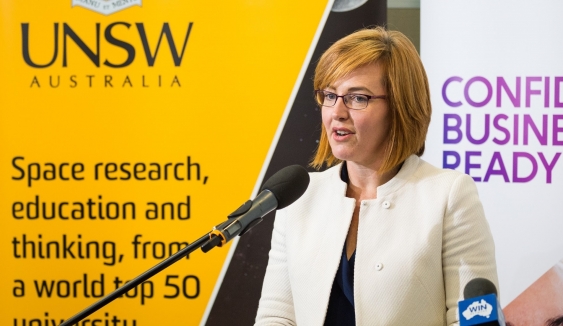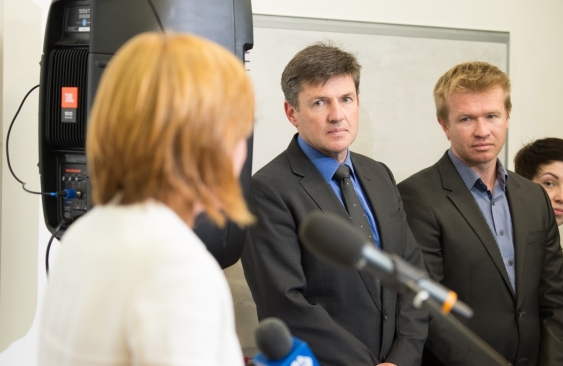The ACT Government has awarded UNSW Canberra $750,000 to create a world-class Space Mission Design Facility and to jointly develop a ground station for quantum encrypted satellite communication.
The Government funding, announced today by the ACT Minister for Higher Education, Training and Research, Ms Meegan Fitzharris, supports projects highlighted as key within the Defence White paper. It is also backing for space-focussed Key Capability Areas in the ACT’s future high tech economy.
“The potential of Canberra’s space economy is enormous,” said Minister Fitzharris. “The Defence White Paper (DWP), released earlier this year, emphasised the need for sovereign Australian capability in key areas and committed the Commonwealth Government to spend approximately $17 billion over the next ten years on intelligence, surveillance and reconnaissance, space, electronic warfare and cyber security.”

Ms Meegan Fitzharris makes the funding announcement at UNSW Canberra. Photo: Michael Jackson-Rand/UNSW
Announcing the backing, Minister Fitzharris said $375,000 would go to UNSW Canberra’s Space Mission Design Facility, a world-class centre for rapid, rigorous and collaborative space mission development. At the core of the Space Mission Design Facility is a specialised suite of design software tools and IT infrastructure. It creates an environment in which spacecraft design engineers, scientists and planners can collaborate to rapidly design and determine the technical and economic viability of space missions.
"The Space Mission Design Facility, hosted at UNSW Canberra, will help cement the ACT’s position as the innovation focal point within the growing national space economy."
The Minister also announced $375,000 in funding towards Space Based Quantum Communications, a collaborative venture which brings together the space, telescope, adaptive optics, quantum information and optical communications capabilities of UNSW Canberra, ANU, and local industry QuintessenceLabs and Liquid Instruments. Its goal is to establish a ground station for quantum encrypted satellite communication.
“The Space Mission Design Facility, hosted at UNSW Canberra, complements ANU’s test facilities and will help cement the ACT’s position as the innovation focal point within the growing national space economy,” said Professor Russell Boyce, Director of UNSW Canberra’s space program. “This facility, as well as the development of the quantum ground station capability, will open up new opportunities to connect industry and research across the ACT, Australia and globally, driving innovation and education in the process.”
Associate Professor Andrew Lambert, from UNSW Canberra's School of Engineering & Information Technology, said the funding would help establish Australia as a world leader in global secure communications. “The Space Based Quantum Communications project combines UNSW Canberra’s space tracking telescopes and adaptive optics with ANU’s laser and quantum communications capabilities, augmented by the linkage with local industry. Our joint work is a fantastic opportunity for collaboration within Canberra."

Minister Fitzharris addresses UNSW Canberra's Professor Russell Boyce (left) and the ANU's Professor Daniel Shaddock. Photo: Michael Jackson-Rand/UNSW
UNSW Canberra has made a $10 million strategic investment to build a domestic space program, which includes assembling a team of space engineers and scientists.
“Part of our investment involves bringing world-class Australian space talent back from the international space sector and reversing the brain drain,” said UNSW Canberra Rector, Professor Michael Frater.
UNSW Canberra’s Master of Space Engineering and Master of Space Operations degrees offer unique up-skilling for Defence and non-Defence professionals working in the space sector and related industries.
“UNSW Canberra is playing a key role in the transformation of space technology and helping Australia to become an important space-faring nation in ways that make economic sense and meet national needs,” Professor Frater said.
Given the combination of UNSW Canberra’s space program and ANU’s Advanced Instrumentation Technology Centre spacecraft test facilities, the potential of Canberra’s space economy has been recognised by business and government. The city is home to Australia’s two leading space research universities and is the location for multinational corporates such as Lockheed Martin, Northrop Grumman and Airbus Defence and Space, as well as leading smaller enterprises such as Locata. The ACT Government has played a key role in the local space sector’s success.




